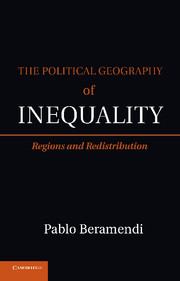
- Publisher:
- Cambridge University Press
- Online publication date:
- April 2012
- Print publication year:
- 2012
- Online ISBN:
- 9781139042796

This book addresses two questions - why some political systems have more centralized systems of interpersonal redistribution than others, and why some political unions make larger efforts to equalize resources among their constituent units than others. This book presents a new theory of the origin of fiscal structures in systems with several levels of government. The argument points to two major factors to account for the variation in redistribution: the interplay between economic geography and political representation on the one hand, and the scope of interregional economic externalities on the other. To test the empirical implications derived from the argument, the book relies on in-depth studies of the choice of fiscal structures in unions as diverse as the European Union, Canada and the United States in the aftermath of the Great Depression; Germany before and after Reunification; and Spain after the transition to democracy.
Honourable Mention, 2014 Luebbert Best Book Award, Comparative Politics Section, American Political Science Association
Winner, 2013 Best Book Award, European Politics and Society Section, American Political Science Association
"Across the world, federations and quasi-federations come in all shapes and sizes. Their welfare and redistributive consequences are also strikingly different. In this terrific, sophisticated, agenda-setting book, Pablo Beramendi explains why. The Political Geography of Inequality is a must-read."
Carles Boix, Princeton University
"By integrating the study of inequality with the study of federalism this ambitious book casts new light on both. The theoretical synthesis Beramendi proposes helps explain such diverse phenomena as why some countries and regions are better able to respond to economic shocks, why some countries can sustain higher levels of redistribution and equality, and why it is so difficult for currency unions like the Eurozone to succeed. The book is a remarkable achievement that will have a major impact on the field of comparative political economy for years to come."
Torben Iversen, Harvard University
"The design of fiscal unions is a topic of central importance not only in Europe but in all countries with some degree of local autonomy. In a methodologically sophisticated analysis, Beramendi destroys several stereotypes according to which local autonomy must be associated with a high degree of individual inequality. This is an eye-opening contribution."
Adam Przeworski, New York University
 Loading metrics...
Loading metrics...
* Views captured on Cambridge Core between #date#. This data will be updated every 24 hours.
Usage data cannot currently be displayed.
Accessibility compliance for the PDF of this book is currently unknown and may be updated in the future.